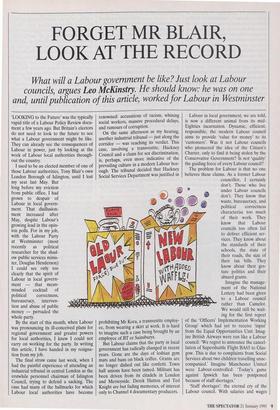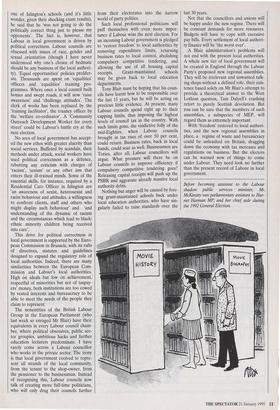FORGET MR BLAIR, LOOK AT THE RECORD
What will a Labour government be like? Just look at Labour
councils, argues Leo McKinstiy. He should know: he was on one
and, until publication of this article, worked for Labour in Westminster
`LOOKING to the Future' was the typically vapid title of a Labour Policy Review docu- ment a few years ago. But Britain's electors do not need to look to the future to see what a Labour government might be like. They can already see the consequences of Labour in power, just by looking at the work of Labour local authorities through- out the country.
recently as political researcher for the shad- ow public services minis- ter, Douglas Henderson) I could see only too clearly that the spirit of Labour in local govern- ment — that mean- minded cocktail of political correctness, bureaucracy, interven- tion and abuse of public money — pervaded the whole party.
By the start of this month, when Labour was pronouncing its ill-conceived plans for regional government and greater powers for local authorities, I knew I could not carry on working for the party. In writing this article, I have handed in my resigna- tion from my job.
The final straw came last week, when I had the painful experience of attending an industrial tribunal in central London as the erstwhile personnel chairman of Islington Council, trying to defend a sacking. The case had many of the hallmarks for which Labour local authorities have become renowned: accusations of racism, whining social workers, massive procedural delays, and rumours of corruption.
On the same afternoon as my hearing, another industrial tribunal — just along the corridor — was reaching its verdict. This case, involving a transvestite, Hackney Council and a claim for sex discrimination, is, perhaps, even more indicative of the prevailing culture in a modern Labour bor- ough. The tribunal decided that Hackney Social Services Department was justified in prohibiting Mr Kora, a transvestite employ- ee, from wearing a skirt at work. It is hard to imagine such a case being brought by an employee of BT or Sainsburys. But Labour claims that the party in local government has radically changed in recent years. Gone are the days of lesbian gym mats and bans on black coffee. Grants are no longer dished out like confetti. Town hall unions have been tamed. Militant has been driven from its citadels in London and Merseyside. Derek Hatton and Ted Knight are but fading memories, of interest only to Channel 4 documentary producers. Labour in local government, we are told, is now a different animal from its mid- Eighties incarnation. Dynamic, efficient, responsible, the modern Labour council aims to provide 'value for money' to its `customers'. Was it not Labour councils who pioneered the idea of the Citizen's Charter, only to find it being stolen by the Conservative Government? Is not 'quality' the guiding force of every Labour council?
political correctness characterise too much of their work. They know that Labour councils too often fail to deliver efficient ser- vices. They know about the standards of their schools, the state of their roads, the size of their tax bills. They know about their ges- ture politics and their absurd grants.
Imagine the manage- ment of the National Lottery had been given to a Labour council rather than Camelot. We would still be wait- ing for the first report of the 'Officers' Implementation Working Group' which had yet to receive 'input' from the Equal Opportunities Unit. Imag- ine British Airways were run like a Labour council: 'We regret to announce the cancel- lation of Supershuttle Flight BA65 to Glas- gow. This is due to complaints from Social Services about two children travelling unac- companied.' Imagine Manchester United were Labour-controlled: `Today's game against Ipswich has been postponed because of staff shortages.'
`Staff shortages': the eternal cry of the Labour council. With salaries and wages accounting for more than 75 per cent of local authorities' expenditure, staffing problems are a major cause of the chronic waste in Labour authorities. The very cul- ture of such councils works against efficien- cy in the. workforce. There is a constant emphasis on employment rights, with the result that it is difficult to dismiss anyone, even for serious offences. Rigorous job descriptions for every post only encourage idleness and hinder initiative. Byzantine management structures are an incentive to buck-passing. With generous conditions and no fear of dismissal, levels of sickness are often appalling — in Islington five times that of the local private sector.
Given this background, it's hardly sur- prising that when Islington Council tax staff went on strike two years ago, the tax collection rate improved. Their work was done more efficiently by a small number of private agency staff. The same happened when housing benefits staff took industrial action; backlogs started to clear for the first time in months.
Strikes are a feature of life in Labour authorities, often called without a ballot. The trade unions know that they can act with impunity, since Labour councillors most of them union members themselves — are reluctant to invoke 'Tory' legislation. The unions, with their long Labour tradi- tions and formal role in council negotiating machinery, still exert a great influence in many Labour town halls. And whenever any problem arises — from a breakdown in community care to the poor upkeep of a housing estate — it is never caused by their own members or the council's incompe- tence, but by 'chronic underfunding and lack of basic resources from the Govern- ment'.
Labour representatives at Westminster, spoon-fed by researchers from the trade unions and local authority associations, parrot this nonsense about funding. When this year's settlement of local authority finance was announced in the Commons in December, Clive Betts MP, the former leader of the notoriously inefficient Sheffield City Council, warned that local authorities would have to make 'substantial cuts in their services'. He then preposter- ously asserted that 'outside the house John Gummer will go down as "Gummer the Godfather" '. I have yet to hear any of my neighbours complain that the local library is closed on Fridays because of `Gummer the Godfather'.
Islington Council, like so many other Labour authorities, has bleated about cuts since 1979. Yet this is the council that spent thousands on a racial hqrassment hotline that was never installed and on teachers who were never appointed. This is the council with millions uncollected in rent, poll tax and council tax.
A report by the Audit Commission last week gave the lie to Labour claims about cuts. It showed that local authorities had increased their spending on management posts by an astonishing 60 per cent over the last five years. But that's what Labour is good at: creating bureaucracy. Establishing a new body is one of the few solutions a Labour policy-maker can ever propose when confronted with a problem. Worried about crime? Set up a Crime Prevention Council. Worried about teaching stan- dards? Set up a General Teaching Council.
Since Labour is now the party of local government — as we are constantly told in boastful tones — it follows that the bureau- cracy of local government must be growing rapidly. Labour authorities expand their structures like the many-headed hydra of the Herculean myth: for every committee or unit removed, two will sprout in its place. When I served on Islington Council, it was riddled with obscure bodies, such as the 'Notional Tenants Account Working Party' and the 'Central Heating Charges Review Group'.
Other Islington Council bodies have caused more controversy, especially those of a politically correct hue, like the Women's Unit, the Race Equality Unit and the Lesbian and Gay Committee. When Tony Blair decided not to send his son to one of Islington's schools (and it's little wonder, given their shocking exam results), he said that he 'was not going to do the politically correct thing just to please my Opponents'. The fact is, however, that Labour in local government is driven by political correctness. Labour councils are obsessed with issues of race, gender and sexual orientation (though I have never understood why one's choice of bedmate should be any business of the local authori- ty). 'Equal opportunities' policies prolifer- ate. Thousands are spent on 'equalities' officers and 'equalities' training pro- grammes. Where once a local council built homes and swept roads, it will now 'raise awareness' and 'challenge attitudes'. The clerk of works has been replaced by the `training facilitator', the truancy officer by the 'welfare co-ordinator'. A 'Community Outreach Development Worker for every street' could be Labour's battle cry at the next election.
No area of local government has accept- ed the new ethos with greater alacrity than social services. Buffeted by scandals, their methods under attack, social workers have used political correctness as a defence, rebutting any criticism with charges of `racism', 'sexism' or any other ism that enters their ill-trained minds. Some of the essential skills, for instance, required by a Residential Care Officer in Islington are `an awareness of sexist, heterosexist and racist behaviour and attitudes, a willingness to confront clients, staff and others who might display such behaviour' and 'and understanding of the dynamic of racism and the circumstances which lead to black/ ethnic minority children being received into care'.
This drive for political correctness in local government is supported by the Euro- pean Commission in Brussels, with its rafts of directives, statutes and guidelines designed to expand the regulatory role of local authorities. Indeed, there are many similarities between the European Com- mission and Labour's local authorities. High on ideals but low on achievement, respectful of minorities but not of taxpay- ers' money, both institutions are too cowed by vested interests and bureaucracy to be able to meet the needs of the people they claim to represent.
The nonentities of the British Labour Group in the European Parliament (who last week so enraged Mr Blair) have their equivalents in every Labour council cham- ber, where political obsessives, public sec- tor groupies, ambitious hacks and further education lecturers predominate. I have rarely come across a Labour councillor who works in the private sector. The irony is that local government evolved to repre- sent all strands of the local community, from the tenant to the shop-owner, from the pensioner to the businessman. Instead of recognising this, Labour councils now talk of creating more full-time politicians, who will only drag their councils further from their electorates into the narrow world of party politics.
Such local professional politicians will puff themselves with even more impor- tance if Labour wins the next election. For an incoming Labour government is pledged to 'restore freedom' to local authorities by removing expenditure limits, returning business rates to local control, abolishing compulsory competitive tendering, and allowing the use of all housing capital receipts. Grant-maintained schools may be given back to local education departments. Tony Blair must be hoping that his coun- cils have learnt how to be responsible over the last 15 years, but he will be acting on precious little evidence. At present, many Labour councils spend right up to their capping limits, thus imposing the highest levels of council tax in the country. With such limits gone, the vindictive folly of the mid-Eighties, when Labour councils brought in tax rises of over 50 per cent, could return. Business rates, back in local hands, could soar as well. Businessmen are Tories, after all, Labour councillors will argue. What pressure will there be on Labour councils to improve efficiency if compulsory competitive tendering goes? Releasing capital receipts will push up the PSBR and aggravate already massive local authority debts. Nothing but anger will be caused by forc- ing grant-maintained schools back under local education authorities, who have sin- gularly failed to raise standards over the last 30 years.
Not that the councillors and unions will be happy under the new regime. There will be constant demands for more resources. Budgets will have to cope with excessive pay bills. Every settlement of local authori- ty finance will be 'the worst ever'.
A Blair administration's problems will not end with the present local authorities. A whole new tier of local government will be created in England through the Labour Party's proposed new regional assemblies. They will be irrelevant and unwanted talk- ing shops without a defined role, their exis- tence based solely on Mr Blair's attempt to provide a theoretical answer to the West Lothian question, Tam Dalyell's crushing retort to purely Scottish devolution. But you can be sure that the members of such assemblies, a subspecies of MEP, will regard them as extremely important.
With 'freedom' restored to local authori- ties, and the new regional assemblies in place, a regime of waste and bureaucracy could be unleashed on Britain, dragging down the economy with tax increases and regulations on business. But the electors can be warned now of things to come under Labour. They need look no further than the present record of Labour in local government.
Before becoming assistant to the Labour shadow public services minister, Mr. McKinstry was parliamentary assistant to Har- riet Harman MP, and her chief aide during the 1992 General Election.




























































 Previous page
Previous page